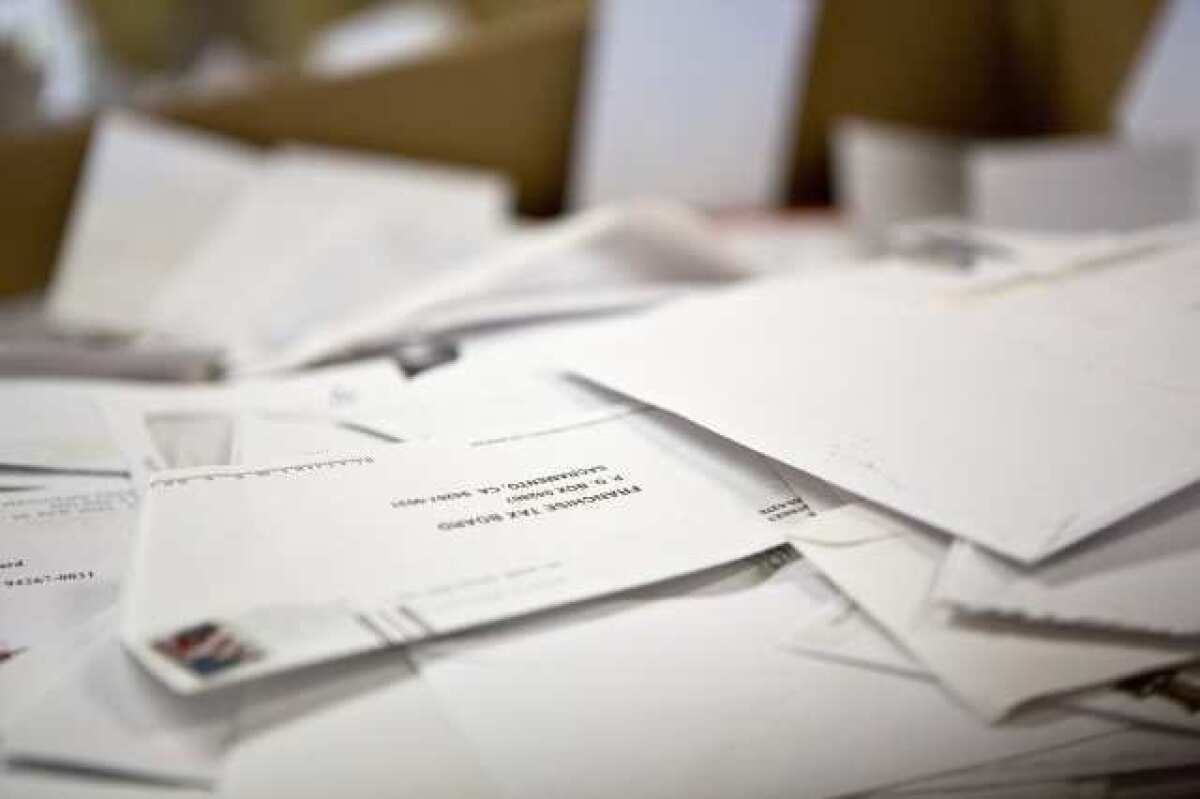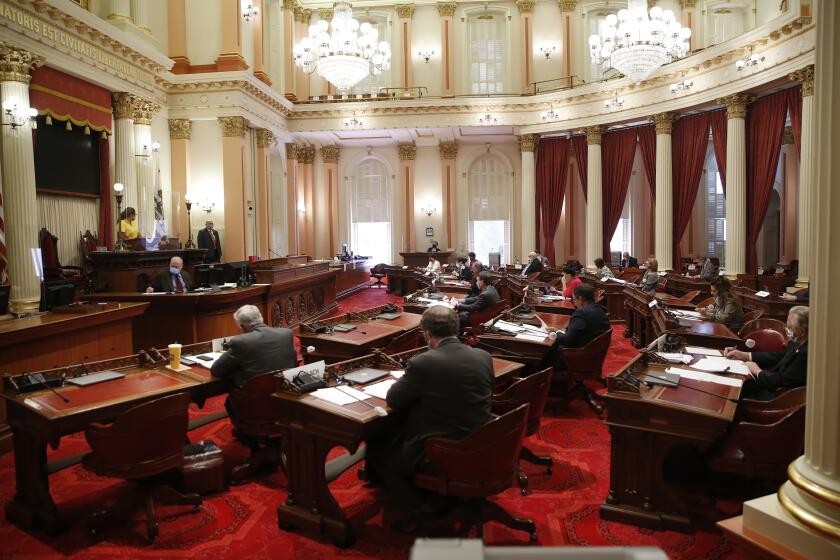Column: California is too dependent on the rich. Now isn’t the time for another millionaires’ tax

- Share via
SACRAMENTO — Democratic legislators want California’s richest taxpayers to “pay their fair share.” But by any objective measurement, they already do — plus a bunch.
We’re talking about state taxes, not federal.
The richest Americans arguably should pay a fairer share of federal taxes. President Trump and the then-Republican Congress lowered federal income tax rates in 2017, and the beneficiaries were primarily the wealthy and corporations.
But Trump and Republicans also made it financially harder on homeowners and middle-to-upper income people in high-tax states such as California. They did that by placing a $10,000 cap on the state and local taxes that could be deducted on federal tax returns. That was a tax hike for many and should be repealed.
Even lefty senators Bernie Sanders and Elizabeth Warren should like California’s very progressive state income tax. It has the highest top state rate in the nation. But liberal Sacramento Democrats want to boost rates still higher.
Put it this way: The top 1% of California taxpayers kick in nearly half the state income tax.
Specifically, the top 1% — with 24% of the earnings — paid 46% of state income taxes in 2018, the last year for which there’s complete data. The bottom 90% paid only about 22%; the bottom 60%, 2.4%.
Bottom line, California is already leaning very heavily on its richest citizens — too heavily for good tax policy.
California’s top rate is 13.3%. Hawaii has the next highest at 11%. New Jersey’s is 10.75%. Every other state’s highest rates are in the single digits.
Seven states have no personal income tax at all, including economic competitors Texas and Florida, and bordering Nevada.
A bill was recently introduced in Sacramento to boost California’s highest rate to 16.8%. But it would kick in only for people making more than $5 million annually.
There’d be an added 1% surcharge on incomes exceeding $1 million, increasing to 3% on earnings above $2 million. At $5 million, a 3.5% surcharge would be triggered.
The so-called millionaires tax would raise an estimated $6.8 billion a year.
Assembly Bill 1253 would impose a new 1% surcharge on adjusted income starting at $1 million, increasing to 3% for those who earn more than $2 million and rising to 3.5% on income above $5 million.
“Californians are jobless and struggling to put food on the table, while the rich contemplate which vacation house to stay in,” the author, Assemblyman Miguel Santiago (D-Los Angeles), said in a statement.
Shortly afterward, the nation’s first “wealth tax” was proposed by Assemblyman Rob Bonta (D-Alameda). It would impose a 0.4% annual levy on net worth of more than $30 million, excluding real estate. That would raise an estimated $7.5 billion from 30,400 Californians.
“Families are hurting right now. COVID-19 has only made matters worse,” Bonta said. “In times of crisis, all Californians must step up and contribute their fair share.”
Both measures are being pushed by teachers unions that are seeking more money for schools.
Teachers are also sponsoring a commercial property tax increase — Proposition 15 on the Nov. 3 ballot. It would raise up to $12 billion annually for schools and local governments by taxing most commercial property based on market value rather than the tight limits imposed by Proposition 13. It would be the first major rollback of the landmark 1978 property tax cut.
Gov. Gavin Newsom seemed leery of the wealth and millionaires taxes when asked about them at a news conference.
“Look, I want to see where things go over the next few months,” he said, referring to the economy, the state’s bleeding budget, hoped-for federal help and whether the property tax initiative passes.
The governor appeared to be worried about scaring off potential investors in the California economy.
“As a state and even at a local level, one has to consider the impacts of these decisions in terms of our competitive environment,” the governor said.
Santiago and Bonta no sooner introduced their bills than they dropped them, at least for this legislative session. Time was running out to reach agreement on politically dicey measures that needed to win two-thirds majority votes for passage. Lawmakers must adjourn by Aug. 31.
But Bonta was hoping that Newsom would call the Legislature back into a special session to consider the tax hikes.
“We need to be nimble and flexible,” he told me. “We can’t just wait until January while wildfires are burning and COVID-19 is spreading. We need more revenue now, not after January.”
And the super-rich could easily afford to dig deeper, both lawmakers insisted.
Sure, California’s income tax is the nation’s highest, Bonta said, “but we have the most millionaires and billionaires too. We have unheard-of wealth in this state…. We also have the highest levels of poverty in the nation…. I’ve never seen such vitriolic and vigorous defense of millionaires and billionaires.”
It just seems like a bad look to me: Democrats perpetually seeking tax increases, even in good times. It feeds the Republican message that Democrats are unbridled tax-and-spenders.
Democrats should focus on finally updating the state’s volatile tax system, which floods the treasury with surplus revenue in boom times and slows to a trickle during busts. That’s because it depends too heavily on wealthy people’s capital gains.
The state needs to broaden its tax base by reducing the top rates and extending the sales tax to commercial services.
But that’s too politically risky and requires leadership. It’s much easier to harass a relatively few rich people.
More to Read
Sign up for Essential California
The most important California stories and recommendations in your inbox every morning.
You may occasionally receive promotional content from the Los Angeles Times.












